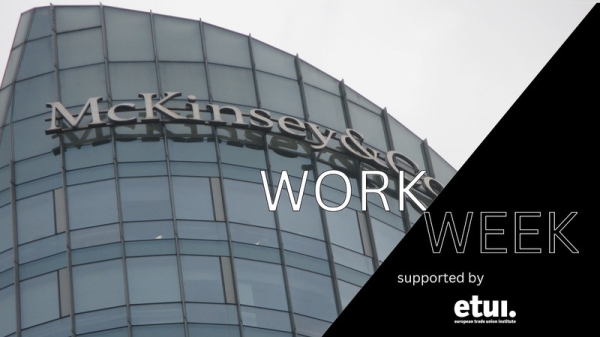Can European governments kick their consulting habit?
Outsourcing public services should be a bit like hiring an electrician or plumber. When something breaks at home that the average person cannot fix with any amount of YouTube DIY videos, we call the experts. We usually do not invite them to move in so they can keep an eye on the light switches and taps, all at an emergency call out rate.
It’s a silly analogy, but one that mirrors the oversized role that big consultancies are playing in government. Economist Maria Mazzucato made her own comparison in an interview with the Financial Times: "A therapist who has their client in therapy forever obviously isn’t a very good therapist." Books like hers (’The Big Con’) and ‘When McKinsey Comes to Town’ by Walt Bodganich are highlighting an issue that trade unions have been raising for years: our governments are being hollowed out by the rise of ‘consultancy culture’.
A recent report by the European Federation of Public Service Unions (EPSU), its affiliates and the University of Greenwich examined the scope and consequences of privatisation in all its forms — public-private partnerships, outsourcing, consultancy, etc — in the central government administrations of a dozen countries and the European Commission. It highlights the European dimension of the growing role of consultancy firms which have become increasingly influential players in public administration.
EPSU has been investigating the commercialisation of public services — such as health and social services, local and regional administration, and immigration detention centres — for a long time, but the report served as a first look at the influence that these consultancies have on key decision making.
Outsourcing in state administration isn’t new. ‘Auxiliary’ functions — such as cleaning, reception, security — have been passed on to companies usually offering low wages. But the nature of outsourcing has changed. Outsourcing fundamental tasks of the state is now the norm: drafting public policy, legislative initiatives, public contracts and public sector restructuring plans, and even proposing staff cuts. These decisions then create a need for even more consultants. It’s a vicious cycle that is slowly privatising the democratic process.
These firms — Accenture, McKinsey, PwC, EY and Deloitte — offer much more than advice. They’re becoming pseudo-governments with their own political agendas. This should raise concerns about transparency, accountability and the cost of public services.
The phenomenon is still growing. In 2019-20, organisational consultancy for the public sector grew to 14 percent of all management consultancy turnover in Europe. The figures range from 31 percent in Greece, 22 percent in Denmark and the UK, 17 percent in Spain, and 9 percent in Germany and France.
In previous reports we have denounced the decline in employment in, for example, tax administrations or labour inspectorates. The employment limits imposed on many ministries and DGs of the European Commission leave gaps in the capacities of civil services. The ‘gaps’ are filled by consultants at a much higher cost. These consultants then apply ‘private sector’ techniques — creating an even higher demand for consultancy services and another vicious circle. Outsourcing is no longer a choice but a necessity.
This ‘consultancy culture’ also contributes to the phenomenon of staff leaving the public sector for the private sector, only to return to the public sector as private consultants. It is often argued that these consultants bring expertise. Instead, they are depriving the public sector of its own expert staff and, paradoxically, increasing bureaucracy. The ‘revolving door’ phenomenon also poses serious risks of conflicts of interest and misuse of influence by former high level public staff.
The European Commission is not immune from questionable use of consultancies. The commission has come under criticism from the European Ombudsman for awarding BlackRock Investment Management a contract to produce a report on banking supervision. The consultancy firm placed an extremely low bid for the contract — bringing BlackRock into a position to influence the European executive’s policymaking, potentially impacting more than 500 million people.
Public administrations across Europe must limit their use of consultancies. In Austria, the federal administration has decided to make less use of consultants, as a large-scale reform of the public sector by consultancy firms has brought the sector into disrepute. The McKinsey tax evasion scandal in France has led to talk of reducing their presence and no longer using them by default.
It’s time to fight for public services that put the interests of people — not profits — first. Limits on the use of consultancies are needed and ‘insourcing’ must be encouraged. With strong trade union representation and collaboration with other civil society groups, it is possible to deliver the quality services that citizens deserve.
Read all the stories as we publish them throughout the week in the Work Week section (or on the homepage, you do you)

